The chances are, more of us are mortal than have multiple orgasms -Violet Weingarten, Intimations of Mortality
When I was diagnosed with non-Hodgkin’s lymphoma, a cancer of the lymphatic system, in 2006, one of my first reactions was to try and find some books which described the new experience I found myself living through. These were very hard to find. The only one I had heard of, based on reading his Times columns some years previously, was John Diamond’s C: Because cowards get cancer too. 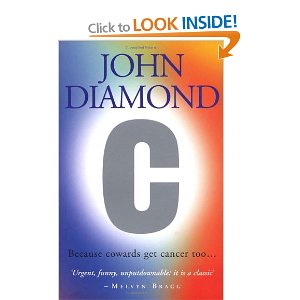
I was a little bit daunted by it, to be honest. For one thing, I knew how the story ended. For another, its status as a ‘classic’ preceded it, trumpeted by no less a personage than Melvyn Bragg on the front cover.
I needn’t have worried.
If such a thing exists, C is a triumphant account of disease. Ever the journalist, Diamond’s forensic prose pares away the clichés of cancer (the so-called ‘battles’, the offers of help from well-meaning friends), holds them up to the light, and finds them mostly wanting.
He is especially strong on the pitfalls of using war metaphor to describe cancer (‘If anyone can fight this, John can’ etc.) which is often used, unthinkingly in my view, the corollary of which links the patient’s chances of survival to their moral fibre. As I have said here before, this is balls. (If you want to find more on this line of thought, Love for Now, my journal-memoir of cancer is available now.)
John Diamond’s Snake Oil continues in much the same ultra-rational vein as its predecessor.
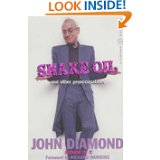 The first half is an unfinished tract which rails against the science of complementary medicine; the second half is a collection of pieces from the Times detailing the final stages of Diamond’s throat cancer. This contains one of my very favourite passages of English prose anywhere. Published on New Year’s Eve, 2000, ‘Reasons to be Cheerful’ ends in a kind of extended prose-poem-list of gratitude hymning the pleasures of ordinary life:
The first half is an unfinished tract which rails against the science of complementary medicine; the second half is a collection of pieces from the Times detailing the final stages of Diamond’s throat cancer. This contains one of my very favourite passages of English prose anywhere. Published on New Year’s Eve, 2000, ‘Reasons to be Cheerful’ ends in a kind of extended prose-poem-list of gratitude hymning the pleasures of ordinary life:
‘It’s about the breakfast you’ve just had and the dinner you’re going to have. It’s about the random acts of kindness which still, magically, preponderate over acts of incivility or nastiness. It’s about rereading Great Expectations and about who’s going to win the 3.30 at Haydock Park. It’s about being able to watch old episodes of Frasier on satellite TV whenever we want, having the choice of three dozen breakfast cereals and seven brands of virgin olive oil at Sainsbury’s. It’s about loving and being loved, about doing the right thing, about one day being missed when we’re gone.’
John Diamond died on March 1, 2001.
In common with the rest of the books on this list, C and Snake Oil outstrip their grim subject matter. Their topic is cancer, but their subject is living.
Written in a different register entirely is Ulla-Carin Lindquist’s Rowing Without Oars. Beautifully translated into limpid English by Margaret Myers, the book tells the story of the final year of life, after diagnosis with ALS (motor neuron disease), of a Swedish TV reporter and ordinary mother-of-four. 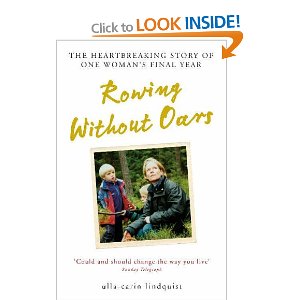
It was given to me just as I reached the early stages of my own remission. If memory serves I read it a bit like a thriller, dreading the outcome, but unable to put it down. I read it cover to cover, twice, in back-to-back readings. It’s still the only book I have done this with.
Among the book’s many admirable qualities is its quietness. Although the effects of the disease it describes are never hidden from the reader, it is written with a spare and elegant authority, that at times borders on the aphoristic. ‘Your family is your Hawaii’, reads one memorable line. ‘You are not your disease’, says another.
Written with a passionate eye for detail, there are marvellous descriptions of all of life: children’s birthday parties, picnics, the changing seasons. Not least among these are the unflinching and unsentimental depictions of small differences in the way the author’s children begin to treat her, knowing she will soon die. I defy you not to be moved.
It is almost a commonplace to find in reviewers’ comments of books such as these that ‘they should change the way you live’.
Journalist Tom Lubbock worked as the art critic for the Independent. In the case of his extraordinary Until Further Notice, I am Alive the statement above is actually true. Like Rowing Without Oars it is written in real time, a journal account of living with an aggressive brain tumour. The tone throughout is wry, bemused, optimistic, reflective. This is a direct book, living in the circle of the final questions. It opens:
The tone throughout is wry, bemused, optimistic, reflective. This is a direct book, living in the circle of the final questions. It opens:
‘The news was death. And it wasn’t going to be maybe good luck and getting through it. It was definitely death, and quite soon, meaning a few years. And at first, it didn’t seem too bad.’
This is not an account of anger with cancer, or even with its metaphors. (In one passage Lubbock glides past the use of war metaphor as though it was the most obvious thing in the world to object it. Obviously I am against it, he says, ‘for Susan Sontag reasons’.)
You do not have to know Illness as Metaphor to appreciate the depth of Lubbock’s point. He is more interested in mounting a sustained metaphysical enquiry into what it means to live dependent upon language, not only in terms of making a living, but also for communicating the most basic of needs, including interacting with his young son.
While there are descriptions of hospitals and conversations with consultants and nurses this is an essentially interior book, spare, knowing, vulnerable and honest: ‘Remember: stay open to weakness. Be open to fear and humiliation and dependency. Be open to helplessness and help. Be prepared for the story to be long and indefinite’.
You can read a review of the book here. Click here to read Lubbock’s last piece for the Observer, from October, 2010.
Mitch Albom’s bestselling Tuesdays With Morrie is the one book I have chosen not to have been written by the person who is doing the dying.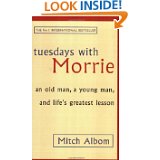 It tells the story of the visits made by Albom to the house of his old college professor, Morrie Schwartz, in the final year of his life:
It tells the story of the visits made by Albom to the house of his old college professor, Morrie Schwartz, in the final year of his life:
‘The last class of my old college professor’s life took place one a week in his house, by a window in the study where he could watch a small hibiscus place shed its pink leaves. The class met on Tuesdays. It began after breakfast. The subject was The Meaning of Life. It was taught from experience’.
Everything you need to know about the book’s procedures is contained in that short paragraph: the precise, conversational and apparently artless prose; the details from nature; the way these are used to show (not tell) the reader that time is short; the slightly serious tone undercut by knowing self-mockery.
As Morrie’s ALS progresses his conversations with the author become ever more focussed on the big questions: how do you live a good life? What can you do to gain happiness? What happens to us when we die?
In my view this is the book’s great contribution. Written with the lightest of touches it spirals around these essential themes with humour, wit and compassion. It’s message remains no less urgent for being told with such warmth: ‘The culture we have does not make people feel good about themselves. And you have to be strong enough to say if the culture doesn’t work, don’t buy into it’.
I will always be in the debt of my friend Babs Short for introducing me to the poetry of Julia Darling. Six months before I was diagnosed with cancer she recommended her classic Sudden Collapses in Public Places. 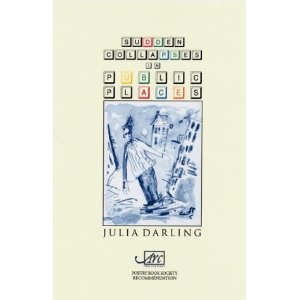 I read it cover to cover, a rarity for me in any case, and with poetry completely unheard of.
I read it cover to cover, a rarity for me in any case, and with poetry completely unheard of.
Among the book’s many qualities is the no-nonsense directness of the metaphors Darling uses, so much more creative than those of war and battles, to describe the effects on her body of her breast cancer and the methods used to treat it.
Thus, the speaker’s body becomes a house with a temporary extension, sleep is described as a friend she has fallen out with, the hospital a puzzled goddess. These are startling, fresh and not a little humorous.
As she says in her Introduction to The Poetry Cure poetry, through metaphor, can help us ‘step out of the difficult present …[and] establish a sense of control over the body’.
Quietly but never less than powerfully she challenges the status quo. ‘We know cancer is terrible,’ she seems to be saying, ‘but not enough to stop us talking.’ Thus, in the poem ‘Chemotherapy‘, she is able to say ‘the smallest things are gifts’. This was a revelation to me, in that it opened up the possibility of positive thinking on the subject, of change, even.
When my treatment for cancer had finished and I was told by doctors I had reached remission, I made a beeline for this and Julia Darling’s other book of poems on the topic of cancer, Apology for Absence.  It is slightly wider in scope than its predecessor, a tad more mournful, the smile more wry and disconcerting.
It is slightly wider in scope than its predecessor, a tad more mournful, the smile more wry and disconcerting.
The territory is the same, but the ground is suffused with the sadness of needing to savour every last detail. As before there are poems of hospitals, treatment rooms and nurses; but also surreal flights of fancy (‘My Thumb in Leeds’, ‘When I Was Healthy Things Were Often Yellow’); and great tenderness (‘Listening to Jack Listening to Music’, ‘My Daughters Reading in May’).
Ruth Padel has said the book ‘crackles with joy in living and loving’. I would say this is true of both of Darling’s books. I cannot underestimate the influence they had on me. Without them I would not have begun to find and use a language to describe my own experience of cancer in Riddance. In gratitude, if I ever win the lottery, I intend to ensure there copies of each will be placed in waiting rooms across the land.
My final choice is Violet Weingarten’s classic Intimations of Mortality. 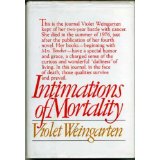 Weingarten was a novelist, children’s author and screenwriter. She was born in San Francisco and grew up in New York City.
Weingarten was a novelist, children’s author and screenwriter. She was born in San Francisco and grew up in New York City.
Not as well known as it ought to be, on this side of the Atlantic at least, this is the only other book, with John Diamond’s C that stood up to being read while I was having my chemotherapy infusions. (Similar to banning war metaphor, I am beginning to think about mounting a campaign to do away with the phrase ‘chemotherapy infusions’: it makes it sound like a cup of herbal tea, when it is anything but).
I first read about Intimations of Mortality in Anne Lamott’s Bird by Bird. Lamott rightly holds it up as an example of telling the truth under duress. I do not think this can be overestimated. Written in 1975, at a time when treatment for cancer was not as advanced as it is today, Weingarten presents a day-by-day account of her ‘two-year battle with cancer’ as the blurb puts it. She died in the summer of 1976, just after the publication of her fourth novel, Half a Marriage. Intimations of Mortality was published in 1978, two years later.
Chief among the book’s qualities is Weingarten’s sardonic self-awareness. This is what prevents the harrowing material from descending into mawkishness or sentimentality:
‘This is the jerkiest journal of all time. Meanwhile Vietnam falls.’
This awareness permeates the writing on another level. ‘It is time to stop proving things’ Weingarten says as her treatment starts. This hard-won wisdom mirrors to the reader what happens when the self and all its attendant ambitions, neuroses and obsessions is brutally stripped away of the comforts of the energy they bring. This unlooked-for paring back is common to all of these books, but I think Weingarten did it first. In her honour I have used the quote at the top of this page as an epigraph to Love for Now.
Happy reading.
Powerful stuff
LikeLike
Glad you like it John and thanks for stopping by as we say! a
LikeLike
A wonderful round-up of great books, for which many thanks Anthony.
LikeLike
Hi Claire Thanks so much for commenting on this. I’m so pleased you saw it. I wanted to feel a list existed for someone who might be in a similar situation. As ever with best wishes Anthony
http://www.anthonywilsonpoetry.com
You can order Love for Now on Amazon here: http://www.amazon.co.uk/Love-Now-Anthony-Wilson/dp/1907605355
LikeLike
I mean Clare, oops i
LikeLike
I read John Diamond’s C when it was published (so many years ago it seems now) from pure interest and knowing his journalism. I re-read it last year during chemotherapy…I agree it felt possible when many other writing did not. Thanks for your thoughts and sharing them. Oh, have you read Christopher Hitchens ‘Mortality’? A short book of essays in his unflinching style published last year. I found it touching, familiar and very human.
LikeLike
Dear Mary
Many thanks for your kind comments and for taking the time to post your thoughts.
I have not read Mortality, but will now seek it out. It sounds excellent.
Wishing you good health and thanks once again
Anthony
LikeLike